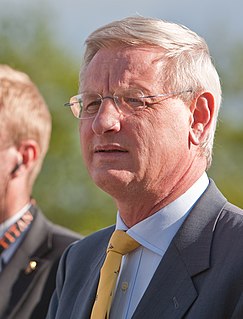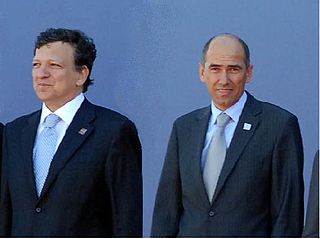Related Research Articles

The Institute of National Remembrance – Commission for the Prosecution of Crimes against the Polish Nation is a Polish government institution in charge of prosecution, archives, education, and, since 2007, lustration, in relation to crimes against the Polish nation. The IPN investigates Nazi and communist crimes committed between 1917 and 1990, documents its findings, and disseminates them to the public.

Nils Daniel Carl Bildt is a Swedish politician and diplomat who was Prime Minister of Sweden from 1991 to 1994. He was the leader of the Moderate Party from 1986 to 1999. Bildt served as Sweden's Minister for Foreign Affairs from 2006 to 2014.

Anders Gunnar Hökmark is a Swedish politician who served as a Member of the European Parliament (MEP) from 2004 until 2019. He is member of the Moderate Party, part of the European People's Party. He previously served as Secretary of the Moderate Party from 1991 to 1999 and Member of the Riksdag (MP) for Stockholm County from 1982 to 2004.

Stéphane Courtois is a French historian and university professor, a Director of research at the French National Centre for Scientific Research (CNRS), Professor at the Catholic Institute of Higher Studies (ICES) in La Roche-sur-Yon, and Director of a collection specialized in the history of communist movements and regimes.
In the resolution 1481/2006 of the Council of Europe Parliamentary Assembly (PACE) issued on 25 January 2006 during its winter session, the Council of Europe "strongly condemns crimes of totalitarian communist regimes".

Lars Göran Axel Lindblad is a Swedish politician and member of the Moderate Party. He served as a member of the Swedish parliament 1997–2010, representing the constituency of Gothenburg. He served as a replacement member of parliament 1993–1997, and again since 2010. Lindblad has chaired the Swedish delegation to the Parliamentary Assembly of the Council of Europe (PACE) and served as Vice President of PACE as well as chair of the Political Affairs Committee. He was a member of the Parliamentary Assembly 2004–2010. In October 2011, he was elected President of the Platform of European Memory and Conscience.
Communist crimes, is a legal definition used in Polish criminal law.

The Institute for the Investigation of Communist Crimes in Romania is a government-sponsored organization whose mission is to investigate the crimes and abuses conducted while Romania was under communist rule, prior to December 1989. Following the Romanian Revolution of 1989, Romania’s Communist government was overthrown and a democratic president was elected in May 1990.

Black Ribbon Day, officially known in the European Union as the European Day of Remembrance for Victims of Stalinism and Nazism, is an international day of remembrance for victims of totalitarian regimes, specifically Stalinist, communist, Nazi and fascist regimes. Formally recognised by the European Union, the Organization for Security and Co-operation in Europe and a number of other countries, it is observed on 23 August and symbolizes the rejection of "extremism, intolerance and oppression". The purpose of the Day of Remembrance is to preserve the memory of the victims of mass deportations and exterminations, while promoting democratic values with the aim to reinforce peace and stability in Europe. It is one of the two official remembrance days or observances of the European Union, alongside Europe Day. Under the name Black Ribbon Day it is also an official remembrance day of Canada, the United States and other countries. The European Union has used both names alongside each other.

The Prague Declaration on European Conscience and Communism was a declaration which was initiated by the Czech government and signed on 3 June 2008 by prominent European politicians, former political prisoners and historians, among them former Czech President Václav Havel and future German President Joachim Gauck, calling for "Europe-wide condemnation of, and education about, the crimes of communism." Much of the content of the declaration reproduced demands formulated by the European People's Party in 2004, and draws heavily on totalitarianism theory.
The Declaration on Crimes of Communism is a declaration signed on 25 February 2010 by several prominent European politicians, former political prisoners, human rights advocates and historians, which calls for the condemnation of communism.

Crimes Committed by Totalitarian Regimes are reports and proceedings of the European public hearing organised by the Slovenian Presidency of the Council of the European Union and the European Commission. The Hearing was organised in response to the request made by the Justice and Home Affairs Council of the European Union on 19 April 2007.

The Institute for the Study of Totalitarian Regimes is a Czech government agency and research institute. It was founded by the Czech government in 2007 and is situated at Siwiecova street, Prague-Žižkov.
Martin Mejstřík is a Czech politician and human rights activist. He is notable for his role as a student leader during the Velvet Revolution that led to the ousting of the Communist regime in Czechoslovakia in November 1989. He served as a Senator in the Senate of the Parliament of the Czech Republic from 2002 to 2008, representing Prague 1 as an independent, and was a member of the Senate Committee on Education, Science, Culture, Human Rights and Petitions. Mejstřík is a founding signatory of the Prague Declaration on European Conscience and Communism and the Declaration on Crimes of Communism. He was also one of the politicians proposing the creation of the Institute for the Study of Totalitarian Regimes. In 2007, he proposed a ban on "communist and all totalitarian propaganda and symbols".

Kristian Gerner is a Swedish historian, author, expert on Eastern Europe and Professor of History at Lund University. From 1994 to 2002, he was Professor of Eastern European History and Culture, also at Uppsala University. Gerner earned his doctorate at Lund in 1984.
The Platform of European Memory and Conscience is an educational project of the European Union bringing together government institutions and NGOs from EU countries active in research, documentation, awareness raising and education about the crimes of totalitarian regimes. Its membership includes 62 government agencies and NGOs from 20 EU member states, non-EU European countries, as well as from the United States, such as the Institute of National Remembrance, the Berlin-Hohenschönhausen Memorial, the Stasi Records Agency and the Victims of Communism Memorial Foundation. The platform has offices in Prague and Brussels (formerly). The President of the platform is Łukasz Kamiński, former President of the Polish Institute of National Remembrance.
The European Public Hearing on European Conscience and Crimes of Totalitarian Communism: 20 Years After was a European public hearing organised by the Czech Presidency of the European Union in the European Parliament on 18 March 2009. The hearing was described by the Presidency as "the third step towards the establishment of a European Platform of Memory and Conscience to support the activities of institutions engaged in reconciling with totalitarian regimes in Europe."
The European Parliament resolution of 2 April 2009 on European conscience and totalitarianism was a resolution of the European Parliament adopted on 2 April 2009 by a vote of 533–44 with 33 abstentions, in which the European Parliament condemned totalitarian crimes and called for the recognition of "Communism, Nazism and fascism as a shared legacy" and "an honest and thorough debate on all the totalitarian crimes of the past century." The resolution also called for several measures to strengthen public awareness of totalitarian crimes.
The Seventy Years Declaration was a declaration initiated by academics Dovid Katz and Danny Ben-Moshe and released on 20 January 2012 to protest against the policies of several European states and European Union bodies on the evaluation, remembrance and prosecution of crimes committed under communist dictatorships in Europe, specifically policies of many European countries and the EU treating the Nazi and Stalinist regimes in Eastern and Central Europe as equally criminal. Presented as a response to the Prague Declaration on European Conscience and Communism initiated by the Czech government in 2008 to condemn communism as totalitarian and criminal, it explicitly rejects the idea that the regimes of Joseph Stalin and Adolf Hitler are morally equivalent, i.e. the totalitarianism theory that was popularized by academics such as Hannah Arendt, Carl Friedrich and Zbigniew Brzezinski and became dominant in Western political discourse during the Cold War, and that has gained new momentum in many new EU member states following the fall of communism, resulting in international resolutions, establishment of research institutes and museums, and a day of remembrance. The declaration also states that communist regimes did not commit genocides, citing the 1948 Genocide Convention which restricts genocide to mass killings related to ethnicity, race, nationality, or religion. The declaration advances the position that the Holocaust was unique, a subject of some debate. The declaration was signed by 70, mostly left-wing, parliamentarians from Europe. It was released on the 70th anniversary of the Wannsee Conference in Berlin.
Neela Winkelmann-Heyrovská is a Czech academic, environmental activist and government official. She is currently the managing director of the Platform of European Memory and Conscience, an educational project of the European Union bringing together government institutions and NGOs from countries of Europe and North America active in research, documentation, awareness raising and education about the crimes of totalitarian regimes.,.
References
- ↑ "UOK - Upplysning om kommunismen". Institute for Information on the Crimes of Communism. Retrieved 2009-10-19.
- ↑ "Czech Prime minister Petr Nečas: The years of totalitarianism were years of struggle for liberty". Platform of European Memory and Conscience. 14 October 2011. Archived from the original on 30 March 2012. Retrieved 14 October 2011.
- 1 2 3 "UOK - Upplysning om kommunismen". Institute for Information on the Crimes of Communism. Retrieved 2009-10-19.
- ↑ "Swedish Government honors victims of Communism and Nazism at August 23 Day Of Remembrance". Victims of Communism Memorial Foundation. August 30, 2010. Archived from the original on May 13, 2011. Retrieved 2011-05-10.
- ↑ "Swedish Minister of Education, Mr. Jan Björklund inaugurates the August 23 international Day Of Remembrance for the victims of Communism and National Socialism". Institute for Information on the Crimes of Communism. Archived from the original on 2011-05-14. Retrieved 2011-05-14.
- ↑ "UOK - Upplysning om kommunismen". upplysningomkommunismen.se.